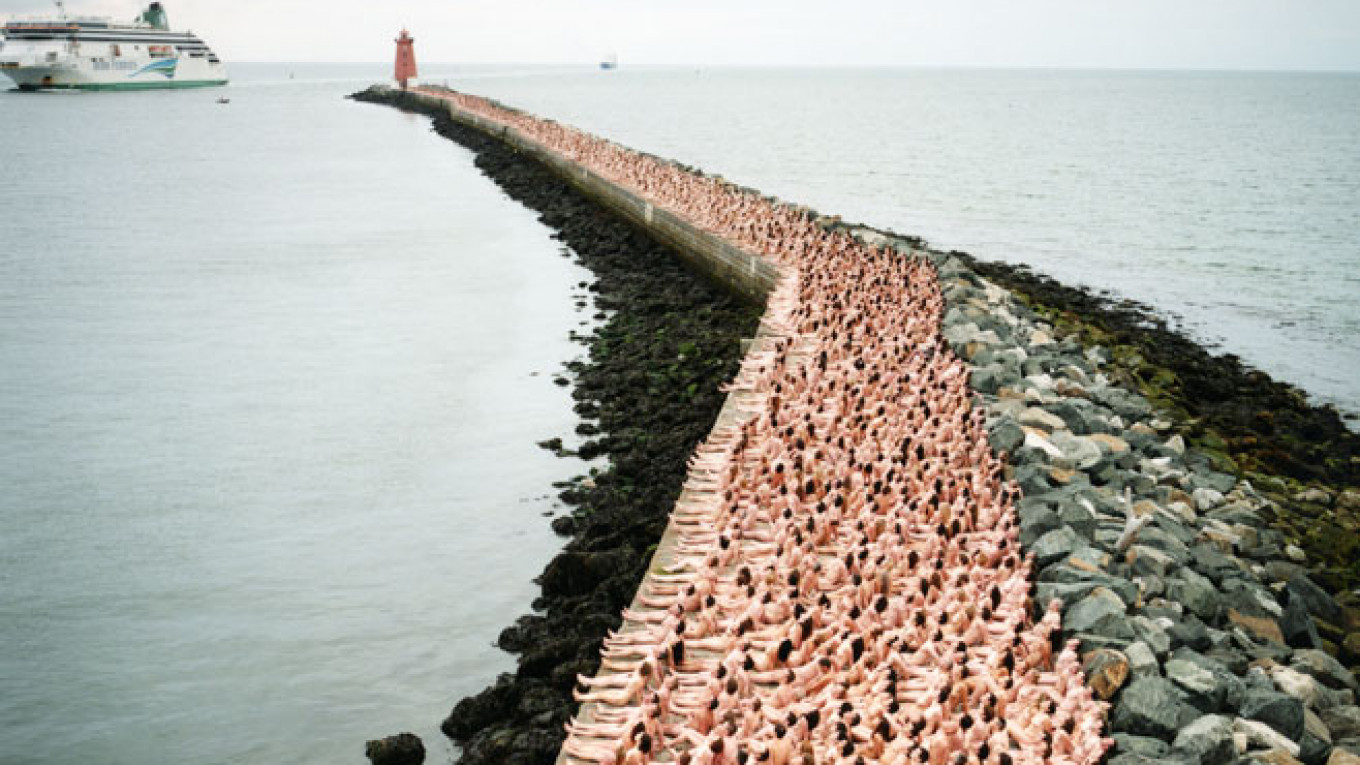Everywhere you look at the new exhibit "Safety in Numbers," at RuArtsGallery, you can see nude bodies. American photographer Spencer Tunick has specialized in mass nude shots for 20 years and on show are naked bodies standing, sitting, even floating, en masse in different settings.
A video at the exhibit shows red and gold painted nudes marching in serried lines along the streets of Munich until they reach a main square. They form circles and patterns and pose like tourists with city monuments.
The viewer is struck by the sheer scale of the mass participation in the photos, the natural beauty of the settings and the beauty of the bodies.
The drama in the work, Tunick said, is quiet and understated: "The body can be used as an abstraction, to present a gradual, powerful and subversive wave of beauty."
"It is a desexualization of the body," he continues, "I am returning the body to art. The art and the process give us time to appreciate the body and not to delegate it to a pornographic state."
His work "Dead Sea" shows more than a thousand nude models floating serenely in the famous salty waters. In "Dublin 2," thousands of bare Irish participants lie down, packed like sardines, on a Dublin dock.
The bodies becomes part of the landscape, another element alongside the rocks and the trees, in permanence. In "Burgundy," rows of models are placed between plants in a vineyard, but, somehow, it doesn't look as out of place as you might imagine.
This particular installation was part of a Greenpeace campaign that sought to highlight the fragility of the vineyard and the fragility of mankind with the threat of global warming. The project used 700 people and was addressed by the president of Greenpeace.
Tunick's first major mass nude work was in 1994 outside the United Nations in New York, called "Reaction Zone," a commentary on the Rwanda crisis at the time.
All the models in his photos are volunteers who sign up via his website.
When you go to sign up, a form on his site asks applicants to mark the color of their skin on a scale that goes from one to seven, from almost white to almost black.
Tunick has been trying to set up a shoot in Moscow since 2001 and he stationed small cards printed with the words "sign up to participate" and his website, SpencerTunick.com in the gallery.
"I know I could get half of you naked," Tunick said hopefully when he addressed the crowds at the exhibit. "I have over a hundred models here."
But are Muscovites willing participants? "I would be interested to take part, but I know that lots of people here would not," said journalist Nina Tomskaya. "This type of art is not common in Russia. People are embarrassed to get naked and express themselves in this way. I think that young people would be willing to get involved."
As for a particular location in Moscow, Tunick is not overly concerned. "The place is not always important — what is important is that the body takes center stage. We will see about what place later."
Tunick always gets permission for a shoot, but he has been unsuccessful in Russia so far.
"My dream is to meet someone in Moscow to make it happen. There is always one person who can help me get a permit," he said.
"Safety in Numbers" runs until Jan. 31 at RuArts Gallery. 10 1st Zachatyevsky Pereulok. Metro Kropotkinskaya. 495-637-4475.
Contact the author at artsreporter@imedia.ru
A Message from The Moscow Times:
Dear readers,
We are facing unprecedented challenges. Russia's Prosecutor General's Office has designated The Moscow Times as an "undesirable" organization, criminalizing our work and putting our staff at risk of prosecution. This follows our earlier unjust labeling as a "foreign agent."
These actions are direct attempts to silence independent journalism in Russia. The authorities claim our work "discredits the decisions of the Russian leadership." We see things differently: we strive to provide accurate, unbiased reporting on Russia.
We, the journalists of The Moscow Times, refuse to be silenced. But to continue our work, we need your help.
Your support, no matter how small, makes a world of difference. If you can, please support us monthly starting from just $2. It's quick to set up, and every contribution makes a significant impact.
By supporting The Moscow Times, you're defending open, independent journalism in the face of repression. Thank you for standing with us.
Remind me later.






